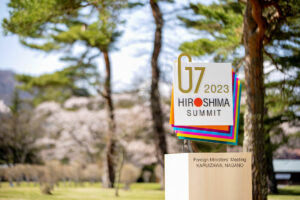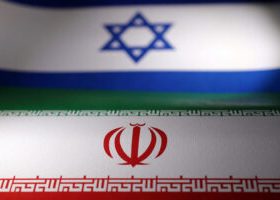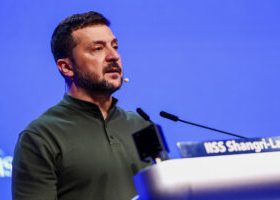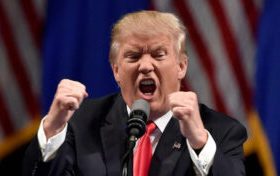HIROSHIMA — Leaders of the world’s richest democracies said on Sunday they would not back down from supporting Ukraine, in a warning to Russian President Vladimir Putin as he claimed to have taken the eastern city of Bakhmut, something Kyiv denied.
The Group of Seven (G7) summit in the Japanese city of Hiroshima was electrified this weekend by the arrival of Ukrainian President Volodymyr Zelensky, who arrived on a French government plane to canvass for greater support against Russia’s invasion.
Mr. Zelensky told reporters on the sidelines of the summit that the battered eastern city of Bakhmut, the focus of fighting in recent months, was destroyed.
“It is tragedy,” Mr. Zelensky said. “There is nothing on this place” — what remained was “a lot of dead Russians.”
There was confusion over whether he had been asked if the city was still in Kyiv’s hands or Russian forces had taken Bakhmut, but a Zelensky spokesperson said the comments were a denial the city had fallen.
Mr. Zelensky later made his way to Hiroshima’s peace memorial, where he laid flowers at the cenotaph for victims of the world’s first nuclear bombing. He is also expected to give a speech in a nation that has seen an outpouring of support for Kyiv’s fight.
During the final day of the three-day G7 summit, US President Joseph R. Biden announced a $375-million package of military aid, including artillery and armored vehicles, for Ukraine.
He told Mr. Zelensky the United States was doing all it could to strengthen Ukraine’s defense against Russia.
“Together with the entire G7 we have Ukraine’s back and I promise we’re not going anywhere,” Mr. Biden said.
Mr. Putin hailed what he said was a victory for his forces, describing it as the “liberation” of Bakhmut in a statement on the Kremlin’s website.
The assault on the largely levelled city was led by troops from the Wagner Group of mercenaries, whose leader Yevgeny Prigozhin said his troops had finally pushed the Ukrainians out of the last built-up area inside the city.
NO ‘FROZEN CONFLICT’
Other leaders of the G7 — the United States, Japan, Germany, Britain, France, Italy and Canada — echoed Mr. Biden’s sentiments.
Canadian Prime Minister Justin Trudeau promised that his country would support Ukraine for as long and as much as necessary.
Mr. Biden told G7 leaders Washington supports joint allied training programs for Ukrainian pilots on F-16s warplanes, although Kyiv has not won commitments for delivery of the fighter jets.
The potential for such training on US-made F-16s was a message to Russia that it should not expect to succeed in its invasion by prolonging conflict, German Chancellor Olaf Scholz said.
British Prime Minister Rishi Sunak said training would start this summer and Ukraine would get the air force it needed for the future.
It was “significant” that the G7 nations showed solidarity in their intention to uphold international law and order during a summit attended by Mr. Zelensky as a guest, said the prime minister of host nation Japan, Fumio Kishida.
Mr. Scholz said that while the immediate priority was supporting Ukraine’s defense, security guarantees for Ukraine needed to be established once the war was over.
Both Mr. Scholz and French President Emmanuel Macron appeared to stand with Ukraine in opposing any notion of the war becoming a “frozen conflict,” or any proposal for peace talks without Russian troops withdrawing.
As Moscow’s 15-month-old invasion has dragged on, several analysts and diplomats have floated the idea that it could become frozen like the conflict on the Korean Peninsula. North and South Korea remain technically at war as their 1950-53 conflict ended with a ceasefire.
“Peace should not make Ukraine a frozen conflict because that would lead to a war in the future. It needs to resolve the problem,” Mr. Macron said.
The Hiroshima summit also gave Mr. Zelensky a chance to lobby for support from other attendees, like Indian Prime Minister Narendra Modi and Brazil’s Brazilian President Luiz Inacio Lula da Silva, who have remained uncommitted.
‘DE-RISK’ FROM CHINA
While determination to help Ukraine repel Russia’s invasion was a key message from the G7 summit, the other was distrust of China as a trading partner.
Mr. Biden met with the leaders of Japan and South Korea on Sunday to discuss military interoperability and the economic coercion they face from China, a US official said.
A day earlier, the G7 leaders outlined a shared approach towards China, looking to “de-risk, not decouple” economic engagement with a country regarded as the factory of the world.
In a statement the G7 also reaffirmed the importance of peace and stability across the Taiwan Strait, where Chinese military exercises have raised concerns over the security of Taiwan, the democratic, self-governed island that China regards as part of its territory.
China’s foreign ministry issued a complaint to Japan expressing firm opposition to the G7 statement, saying it disregarded China’s concerns, had attacked it and interfered in its internal affairs, including Taiwan. — Reuters







